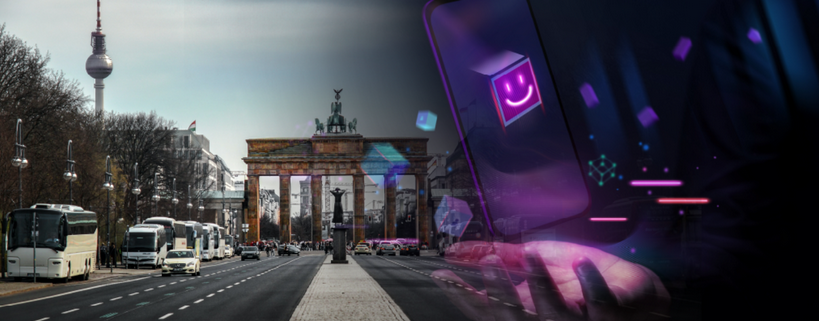 Despite a global venture capital (VC) pullback, shrinking valuations and public market turmoil, Germany’s blockchain VC funding market remained stable this year, with companies in the space securing a total of US$218 million across 20 deals year-to-date (YTD), just US$37 million short of 2021’s US$255 million, a new report by CV VC, a Swiss VC and private equity firm specialized in cryptocurrency and blockchain solutions, shows.
Despite a global venture capital (VC) pullback, shrinking valuations and public market turmoil, Germany’s blockchain VC funding market remained stable this year, with companies in the space securing a total of US$218 million across 20 deals year-to-date (YTD), just US$37 million short of 2021’s US$255 million, a new report by CV VC, a Swiss VC and private equity firm specialized in cryptocurrency and blockchain solutions, shows.
The German Blockchain Report, released last week, looks at the state of the German blockchain ecosystem, delving into the country’s burgeoning blockchain sector and exploring VC funding trends.
According to the report, Germany accounted for 6.2% of European blockchain funding and 1% of global blockchain funding. Decreasing blockchain funding in Germany is reflective of global trends observed this year where blockchain companies secured a total of US$21.7 billion, against US$26.2 billion in 2021.
Despite a slight slowdown in blockchain venture funding activity, Germany maintained its leading position in Europe’s blockchain scene, the report says, and is home today to the largest number of blockchain companies across the whole European Union (EU).
Germany: an early blockchain supporter
Germany’s success as a blockchain hub has deep roots, dated back as early as 2015 when Berlin was the place to be for Ethereum developers.
In 2019, Germany formally showed its commitment to supporting the use of the technology, becoming the first country to adopt a national blockchain strategy. The strategy provides, among other things, guidelines for funding blockchain-related projects and considers various application areas, including financial services and digital identity.
Grasping the technology’s potential from the outset, German authorities have consistently worked towards legitimizing the digital asset landscape and integrating into the financial market.
In this regard, the German Federal Financial Supervisory Authority (BaFin) has played a critical role, introducing in 2020, an amendment to the German Banking Act that brought crypto assets in line with traditional securities, and establishing a new licensing requirements for custody services.
In June 2021, the Electronic Securities Act paved the way for the issuance of digital securities, and by December of the same year, the first e-securities were being issued as bearer bonds from DekaBank.
And in July 2021, Germany passed the Spezialfonds law, a groundbreaking legislation that allows German banks, insurers, and larger corporates to allocate up to 20% of their capital to crypto assets.
At the moment, several state-backed projects are in the works, including a national energy database to track power usage, a system for verifying educational qualifications, and a smart contract registry with the Deutsche Energie-Agentur, according to a report by the EU Blockchain Observatory and Forum released in August 2022.
The EU Blockchain Observatory and Forum, a European Commission initiative to accelerate blockchain innovation and adoption, estimates that Germany is currently home to more than 340 blockchain solution providers and startups, surpassing Estonia with 200+ but behind the UK with 1,000+. The country also has one of the largest pools of blockchain talent in the EU with 4,600 professionals.
German blockchain funding trends
A deeper look into blockchain funding activity in the first three quarters of 2022 reveals that infrastructure and development was the highest-funded segment, making up 55% of all blockchain funding of the period, followed by decentralized finance (DeFi) with a 27% share.
In terms of funding volume, infrastructure and development, and DeFi companies amassed a total of US$120 million and US$57.7 million, respectively.
During the period studied, Worldcoin secured the largest round, closing a US$100 million funding round. Founded in 2019, Worldcoin is building a privacy-focused protocol called Privacy-Preserving Proof-of-Personhood Protocol (PPPoPP) focusing on global money transfers. Worldcoin is currently the first and only German crypto unicorn, worth an estimated US$3 billion, the report says.
After Worldcoin, Composable Finance raised the second largest round of the year, closing a US$32 million Series A in March. Composable Finance is a company that develops blockchain infrastructure and developer tools to address the issue of blockchain interoperability and to ease frictions in deploying decentralized applications (DApps).
At the third position is Soba, a web3 online multiplayer open world and gaming platform that secured US$13.5 million in June, followed by Unstoppable Finance, the owner of the Ultimate self-custody DeFi wallet which raised a US$12.8 million Series A in August, and Chainflip, a decentralized, trustless protocol that enables cross-chain swaps between different blockchains, which closed US$10 million in May.
The release of the German Blockchain Report came in tandem with the opening of the new location of CV Labs Berlin in November 2022, marking the accelerator fourth location after Zug, Vaduz and Cape Town. CV Labs is CV VC’s startup acceleration program.
Featured image credit: Edited from Freepik and Unsplash
Full story here Are you the author? Previous post See more for Next postTags: Blockchain/Bitcoin,Europe,Featured,funding,Germany,newsletter

































